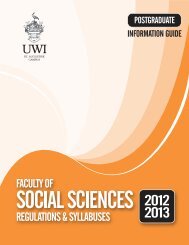Faculty of Humanities and Education (Postgraduate) - The University ...
Faculty of Humanities and Education (Postgraduate) - The University ...
Faculty of Humanities and Education (Postgraduate) - The University ...
Create successful ePaper yourself
Turn your PDF publications into a flip-book with our unique Google optimized e-Paper software.
POSTGRADUATE REGULATIONS & SYLLABUSES 2012 - 2013<br />
THE FACULTY OF HUMANITIES & EDUCATION<br />
Year 2<br />
Semester 1<br />
Course Code Course Title Credits<br />
EDSC 6004 Information <strong>and</strong> Communication<br />
Technologies in the Science Classroom 4<br />
EDSC 6005 Leadership in Science <strong>Education</strong> 4<br />
EDRS 6900 Research Project 10<br />
EDRS 6203 Graduate Research Seminars Pass/Fail<br />
Semester 2<br />
Course Code Course Title Credits<br />
EDRS 6900 Research Project 10<br />
EDRS 6203 Graduate Research Seminars Pass/Fail<br />
COURSE OUTLINES<br />
YEAR: 1<br />
SEMESTER: 1<br />
COURSE CODE: EDSC 6000<br />
COURSE TITLE: SCIENCE AND SCIENCE EDUCATION: NATURE,<br />
HISTORY, NEXUS<br />
NUMBER OF CREDITS : 4<br />
COURSE DESCRIPTION:<br />
Rationale<br />
Beliefs about the nature <strong>of</strong> science - what science is <strong>and</strong> how it<br />
works-underpincurriculumdocuments,textbooks,<strong>and</strong>teachers’<br />
efforts at implementing the science curriculum in the classroom.<br />
However, since the emergence <strong>of</strong> science as a discipline in the 17 th<br />
century, there have been disputes about what counts as science.<br />
This course is designed to <strong>of</strong>fer participants an exploration <strong>of</strong><br />
the ideas about the nature <strong>of</strong> science <strong>and</strong> its philosophical <strong>and</strong><br />
epistemological underpinnings within an historical context. <strong>The</strong><br />
aim is to provide participants with the conceptual framework<br />
necessary to underst<strong>and</strong> the discipline <strong>of</strong> science better <strong>and</strong> to<br />
be able to interrogate school science curricula, documents <strong>and</strong><br />
textbooks, <strong>and</strong> their own science education pedagogy.<br />
OBJECTIVES<br />
At the end <strong>of</strong> the course participants will be able to:<br />
• discuss the philosophical theories underpinning ideas<br />
about the nature <strong>of</strong> science <strong>and</strong> scientific knowledge<br />
• distinguish among selected philosophies <strong>of</strong> science<br />
• identify philosophical underpinnings <strong>of</strong> selected school<br />
science curricula, documents, <strong>and</strong> textbooks<br />
• assess the implications <strong>of</strong> selected philosophies <strong>of</strong> science<br />
for classroom practice<br />
• discuss the relationship between science teachers’ beliefs<br />
about the nature <strong>of</strong> science <strong>and</strong> their pedagogy<br />
• design <strong>and</strong> evaluate strategies for the inclusion <strong>of</strong> the<br />
study <strong>of</strong> the nature <strong>of</strong> science in school science curricula<br />
CONTENT<br />
• Science wars: Great feuds in science<br />
• Constructivism, logical positivism, relativism, na•ve<br />
empiricism<br />
• <strong>The</strong> work <strong>of</strong> Kuhn, Popper, Feyerabend, Lakatos<br />
• Postmodern <strong>and</strong> feminist views on the nature <strong>of</strong> science<br />
• History <strong>of</strong> science as a discipline in western civilisation<br />
• History <strong>of</strong> the impact <strong>of</strong> science curricula from the UK <strong>and</strong><br />
the USA on science curricula in the Caribbean<br />
• Science teachers’ beliefs about the nature <strong>of</strong> science<br />
• Science <strong>and</strong> pseudoscience<br />
• Fundamentals <strong>of</strong> curriculum design<br />
MAJOR COMPETENCIES TO BE DEVELOPED<br />
• Reflection<br />
• Critical thinking<br />
• Enhanced curriculum development skills<br />
ASSESSMENT<br />
• Examination (3 hours) 60%<br />
• Coursework 40%<br />
• Development <strong>of</strong> a module that addresses the nature<br />
<strong>and</strong>/or history <strong>of</strong> science<br />
• Analysis <strong>of</strong> selected science curricula/documents/<br />
textbooks to determine the nature <strong>of</strong> science<br />
embedded<br />
REQUIRED READING<br />
McComas, W. F. (Ed.). (2000). <strong>The</strong> nature <strong>of</strong> science in science<br />
education: Rationales <strong>and</strong> strategies. Dordrecht, <strong>The</strong><br />
Netherl<strong>and</strong>s: Kluwer.<br />
Monk, M., & Dillon, J. (2000). <strong>The</strong> nature <strong>of</strong> scientific knowledge.<br />
In M. Monk & J. Osborne (Eds.),<br />
Good practice in science teaching: What research has to say (pp.<br />
72-87). Buckingham: Open <strong>University</strong> Press.<br />
RECOMMENDED READING<br />
Brickhouse, N. W. (1990). Teachers’ beliefs about the nature <strong>of</strong><br />
science <strong>and</strong> their relationship to classroom practice. Journal<br />
<strong>of</strong> Teacher <strong>Education</strong>, 41(3), 53-62.<br />
Calabrese-Barton, A. (1998). Feminist science education. New<br />
York: Teachers College Press.<br />
Clough, M. P., & Olson, J. K. (2004). <strong>The</strong> nature <strong>of</strong> science: Always<br />
part <strong>of</strong> the science story. <strong>The</strong> Science Teacher, 71(9), 28-31.<br />
Donnelly, J. (1979). <strong>The</strong> work <strong>of</strong> Popper <strong>and</strong> Kuhn on the nature<br />
<strong>of</strong> science. School Science Review, 60(212), 489-500.<br />
Farrell, R. P. (2000). Will the Popperian Feyerabend please step<br />
forward: Pluralistic, Popperian themes in the philosophy <strong>of</strong><br />
Paul Feyerabend. International Studies in the Philosophy<br />
<strong>of</strong> Science, 14(3), 257-266.<br />
Fox-Keller, E., & Longino, H. E. (Eds.). (1996). Feminism <strong>and</strong> science.<br />
Oxford: Oxford <strong>University</strong> Press.<br />
Harding, S. (1998). Is science multicultural? Postcolonialisms,<br />
feminisms, <strong>and</strong> epistemologies. Indiana: IUP.<br />
Matthews, M. R. (1992). Old wine in new bottles: A problem<br />
with constructivist epistemology. In H. A. Alex<strong>and</strong>er<br />
(Ed.), Philosophy <strong>of</strong> <strong>Education</strong> (pp 303-311). Urbana, Ill:<br />
Philosophy <strong>of</strong> <strong>Education</strong> Society.<br />
127

















